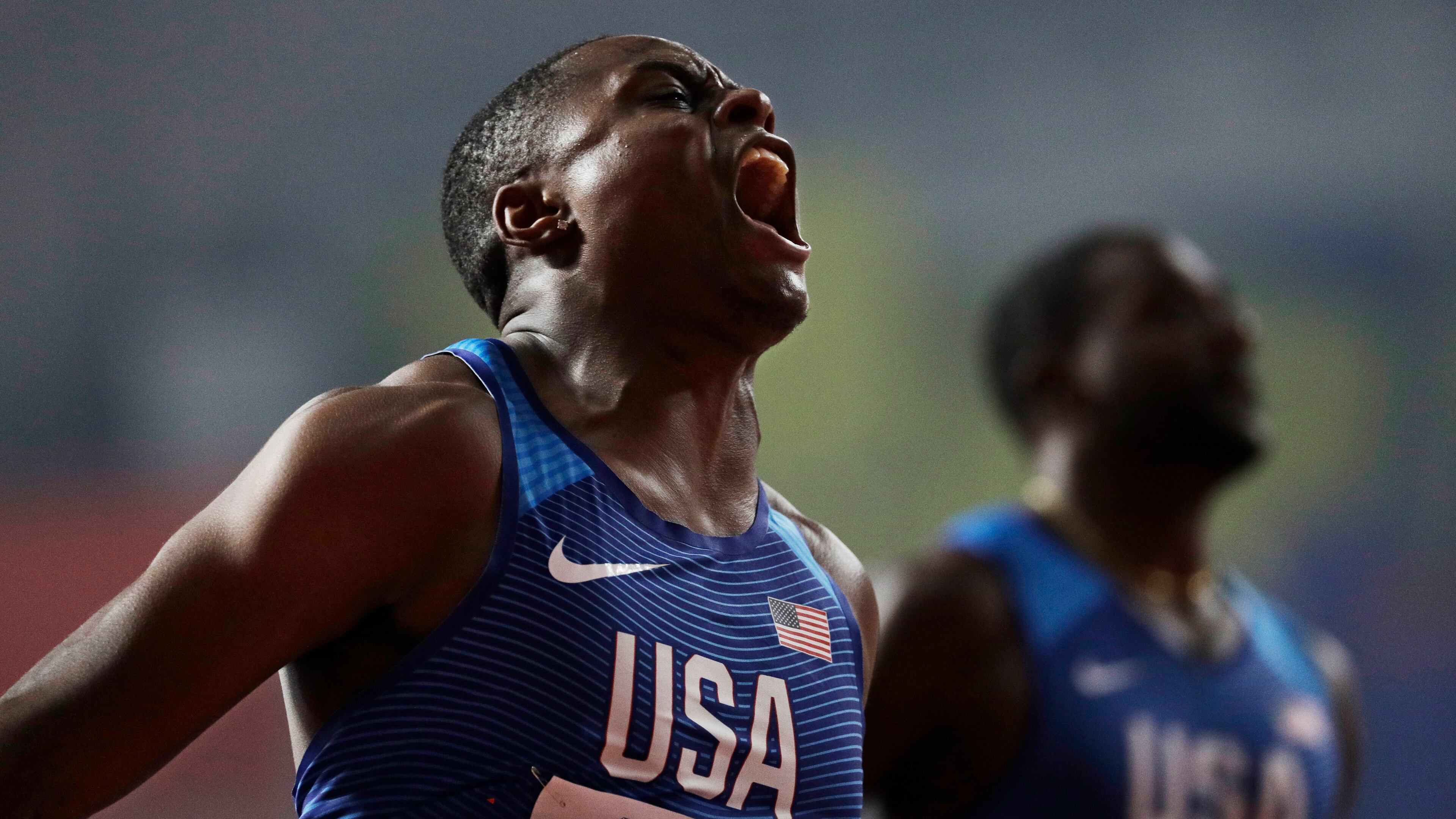Even current world’s fastest man can’t outrun uncertainties of our time

In normal times — remember those? — your reigning active world’s fastest human would be just gearing up. He’d be preparing to run a relay or two at a meet in Florida next week. He then gradually would build speed over a handful of other meets around the world, his carefully tapered training designed to come to a sharp point at the Tokyo Olympics come late July, early August.
Instead, Christian Coleman finds himself just as out of alignment as those of us who couldn’t sprint for 100 meters without leaving behind pieces of hamstring all along the way.
The 24-year-old Coleman is back home in south Atlanta, sharing a crowded house with his parents, two sisters and a 4-month-old niece. Has been for the past two weeks, and he has no idea when he might return to Kentucky, where he works with sprint coach Tim Hall. He’s making it up as he goes along, too, just faster than most.
Since Olympics postponed I might run a 40 again lol
— Christian Coleman (@__coleman) March 27, 2020
The once highly regimented training routine of the defending world champ in the 100 has become a scavenger hunt. He runs at a nearby high school track — and if that has meant occasionally hopping a fence to get in, then so be it. Just consider that training for his next life as a hurdler.
“Growing up that’s what we were used to doing — just hopping the fence to keep it going,” Coleman said.
With gyms everywhere closed he also has had to hunt a private one in another county where he can manage some necessary weight work. All while trying to navigate that fine line between keeping fit and staying coronavirus-free.
In these uncertain times, Coleman is asked, will the fellow favored to succeed Usain Bolt as the Olympic sprint champion get fat on his mother’s cooking and as slow and sedentary as any other couch spud while stuck at home?
“Definitely not,” Coleman said, chuckling. “I’m trying to stay fit. Doing the best I can to keep everything going. Stay fit. You don’t want to overdo it, just keep your body right, so when you start back up training at full capacity you won’t be that far behind.
“It’s a good thing be home around my family, eat some of my mom’s cooking and save a little money, too. It’s a good situation — just don’t eat too much,” he laughed.
One thing still intact is his perspective.
“This is the first time since I left for college (Tennessee) that I’ve been home this long,” Coleman said. “I’m enjoying the quality time I get to spend with my sister and my parents, just being around, especially in times like this. Really puts in perspective that life is short. It can take twists and turns. You never know. You should live in the moment.
“Every time you get an opportunity to be around your loved ones, cherish it. Don’t take your position for granted because these definitely are some crazy times we’re living in.”
His decision to come home was almost made for him, as Kentucky shut down its campus, and with that, shut down Coleman’s training site. “It was his idea,” said his father, Seth Coleman. “He didn’t have any relationships with any high school coaches there who might be able to open up the gate and let him in. There was nothing for him to do in Lexington. If I stay here, he said, I’m doing nothing. I’ll come home, and hopefully I can find some place to train.”
While Coleman was patching together a training plan back home — with input from Hall in Lexington — the decision came to move the Olympics to next year. Coleman regarded that as the only way to go, in order “to give everybody a fair chance to start their training over and make everyone feel comfortable enough to go out and compete at the highest level,” he said.
He hasn’t run competitively since February, when he won the 60-meter sprint at the U.S. Indoor Championships. Before that, he last ran in the World Championships last September/October. There he won the 100 meters in 9.76 seconds, the sixth fastest time ever, and was part of the gold-medal winning 4x100 relay team.
With the Olympics pushed far back and with the world in such upheaval, the athlete who best adapts may also be best positioned to thrive when some normalcy returns to the athletic calendar.
Unprecedented times call for a little discipline and imagination. Coleman is attempting to apply both.
“Everybody is trying to figure it out as we go,” he said. “As a professional, you have a routine. Right now is the time that will separate the good from the great in the sport — really in all of sports. Basically, you’ll take a whole year off, change up your plans on the fly and we’ll see who’s at their best a year from now.
“If you’re able to come out on top after all this, it definitely solidifies your spot in history as being one of the best.”
For the properly motivated and the well-grounded, 2021 can’t come soon enough. Thoughts of that can compel a man to stay up to speed, regardless of what that may take.
“I think it will be one of the biggest Olympics ever because a lot of people are going to tune in after an off year,” Coleman said. “I’m super excited to go out and showcase my talents on that global stage, represent my country and take full advantage of it.”

